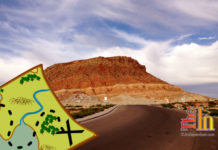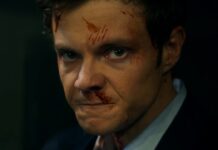
The peril of our planet
Thank you, Firestick; thank you, Roku; and, especially, thank you, Netflix.
I feel so Millennial.
Really.
I feel liberated from the standard and meager offerings of commercial satellite television, and although I’m at the mercy of my Internet connection, I am patient enough to wait it out because of the wealth of material being produced these days to enhance a medium cursed by reality TV and religious, political, and cultural propagandists.
Online, you can go from the mindless frivolity of goofy old sitcoms that really weren’t as funny as we once thought to some important stuff that can heighten our social conscience and responsibility.
Through Netflix, we have had some amazing doors open into the complexity of this little blob we ride around the sun, particularly when it comes to trying to save it from the rest of humanity.
I’ve been blessed with some incredible viewing experiences, topped by the incomparable documentaries “Blue Planet” and “Our Planet” with the sonorous voice of David Attenborough, to a series titled “One Strange Rock” and narrated by Will Smith, who has shown us a much different perspective than his Fresh Prince personification.
These documentaries stand out because they explore our world and the dangers it faces from the footprint that has stomped across our ecological and biological horizon.
The videography is breathtaking, the information startling.
We just finished binge-watching — a Millennial term if ever there was one — the “One Strange Rock” series, which featured a collection of former astronauts who spent significant time aboard the International Space Station. Their experiences and perspective after their journeys mix well with the narrative of the current state of our planet.
Their words were eloquent as they discussed how we got here and how we have made a mess of our home.
Together, these eight astronauts spent about 1,000 days in Earth’s orbit, their activities onboard the ISS mixed with splendid video vignettes from a most unique perspective.
What we learned is how we are these tiny, little bits of life material that control the course of our very existence, how we are all connected in this struggle for survival, how the biological thread sutures us together, whether flora or fauna.
It’s a valuable lesson these days as we seem more bent on destruction and separation than ever.
From their perch aboard the ISS, I can see how when looking down from space these travelers don’t see national boundaries, political parties, cultures, and creeds. Instead, they view a planet, whole without the human exigencies that pit us against each other.
It’s an interesting dichotomy that points out that for all the progress humankind has made since we first crawled ashore, we are still crude, tribal bands that would without hesitation march forward and wipe each other out in the struggle for supremacy. In so doing, we pollute our air and water, trample the fragility of our biological balance, and build physical and emotional walls that separate us.
For all of our intellectual and physiological advances, humanity is not terribly humane.
We have become loud, rude, bullying creatures with little care for the greater good.
I mean, if we are not willing to take the necessary steps to preserve the most basic of elements that support us — air, water, food — then how can we declare ourselves as possessing even a nugget of decency and comradeship?
In the final episode of “One Strange Rock,” we saw video of astronaut Peggy Whitson speeding back to Earth on a Russian space vehicle. We rode along with three astronauts, gritting their teeth as they made the dangerous reentry to Earth’s atmosphere. I guarantee you that at that moment, it did not matter which language they spoke, where their homeland was located, or their political persuasion. These were three remarkable scientists, pioneers returning to share their discoveries, and nothing else mattered as long as they touched down safely in some barren field in Kazakhstan. The astronauts featured in this documentary series — Chris Hadfield, Nicole Stott, Jeffrey A. Hoffman, Mae Jemison, Leland Melvin, Mike Massimino, Jerry Linenger and Whitson — are not wide-eyed kids all giggly and amped after spilling off Kingda Ka, whose 400-foot drop makes it the scariest rollercoaster in the world. That’s child’s play, really, when compared with the 17,500-mph speed at which the International Space Station, larger than a football field and weighing in at some 450 tons, orbits Earth 250 miles into space.
And in practice, when it comes to the space station, there’s really no political maneuvering between the nations that united to build and maintain it, just the neverending quest for scientific knowledge to be explored and shared.
As we watched this series, I found myself wondering, “Could I?” “Would I?”
The answer, sadly, is no.
The rigors of space travel are beyond my years, and I would not fare well in such a claustrophobic environment.
But I don’t have to, because these surrogate pioneers, from the astronauts to the series’ producers, have pieced together a jaw-dropping documentary series that underscores the seriousness regarding the state of our planet and how the impact we each put on it may seem so small and insignificant but is, in reality, anything but small and insignificant.
The series is user friendly, not loaded with scientific jargon that so few could actually understand or decipher, and Smith does a remarkable job of giving it to us in peoplespeak, his script crafted by gifted wordsmiths who took the complex elements and boiled them down to simple terms we could more easily digest.
We are a planet in peril, a gurgling cauldron of toxicity that poisons our waters and pollutes our air; a place where our excesses, over what is a relative blink of the eye in time and space, are depleting finite resources; a place where science is scoffed at and overridden by a fragmented a body politic splintered by charlatans on the shakedown.
The Earth is a tough cookie. But quite frankly, it did just fine before we came out of the primordial ooze and will fix itself after it expels the humans who turned it into a flaming dumpster.
I am grateful for the heralds who bring us these important documentaries and commentaries on our humble existence and relationship with our planet.
I only hope that the underlying message of all of this — that we are all in this together — is not lost on the unwashed masses.
The viewpoints expressed above are those of the author and do not necessarily reflect those of The Independent.
How to submit an article, guest opinion piece, or letter to the editor to The Independent
Do you have something to say? Want your voice to be heard by thousands of readers? Send The Independent your letter to the editor or guest opinion piece. All submissions will be considered for publication by our editorial staff. If your letter or editorial is accepted, it will run on suindependent.com, and we’ll promote it through all of our social media channels. We may even decide to include it in our monthly print edition. Just follow our simple submission guidelines and make your voice heard:
—Submissions should be between 300 and 1,500 words.
—Submissions must be sent to editor@infowest.com as a .doc, .docx, .txt, or .rtf file.
—The subject line of the email containing your submission should read “Letter to the editor.”
—Attach your name to both the email and the document file (we don’t run anonymous letters).
—If you have a photo or image you’d like us to use and it’s in .jpg format, at least 1200 X 754 pixels large, and your intellectual property (you own the copyright), feel free to attach it as well, though we reserve the right to choose a different image.
—If you are on Twitter and would like a shout-out when your piece or letter is published, include that in your correspondence and we’ll give you a mention at the time of publication.



